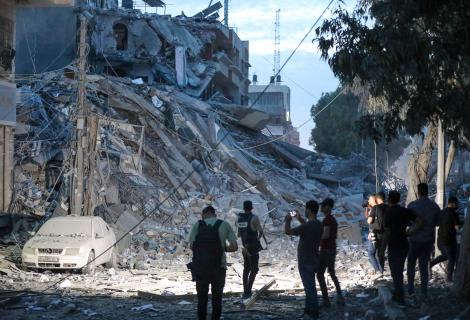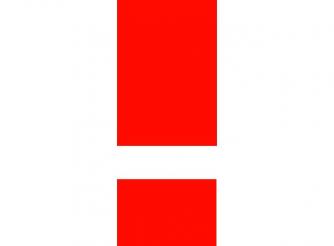“Even if one day death waits for me, I must continue the journey, my message...”: The Palestinian reporters risking their lives and their families as Gaza becomes the deadliest place for journalists on earth

On World Press Freedom Day, journalists in Gaza have been risking their lives to share their vital reporting with the world since Israel's bloody military campaign began, as the territory has become the deadliest place in the world for journalists. More than 122 journalists and media workers have been killed in Gaza in the last seven months, according to the UN. In comparison, 17 journalists have died in Russia and Ukraine since the war began in 2022, and 63 journalists were killed during the entire 20-year Vietnam War. The Committee to Protect Journalists (CPJ) reports that more than three-quarters of journalists killed in 2023 died in Gaza. Additionally, three journalists in Lebanon were killed by Israeli airstrikes, and four Israeli journalists lost their lives in the Hamas attacks on October 7, the UN said.
ActionAid has interviewed numerous journalists in Gaza to understand the harsh realities of reporting under occupation and relentless attack, amidst what is now considered one of the world's most severe humanitarian crises and the deadliest place to be a journalist on earth.
Majdy Fathi, 43, a photojournalist from Gaza City, who has been covering the crisis, said journalists had no protection: “The biggest challenge I faced while covering the conflict is that [the] Israeli [army] does not differentiate between a journalist and another... Unfortunately, there is no protection for journalists or respect [of] conventions that stipulate avoiding or harming journalists in times of war.’
“The role of journalists is very important because without their images, the world would not have seen the extent of the destruction and war on Gaza. [The] Israeli [authorities] prevented foreign journalists and other countries from entering Gaza to cover the conflict. This increased our important role and the necessity of [continuing our] work, so that the world can watch, and see the correct picture of Gaza. My goals and what I highlight are the extent of the destruction that befell Gaza and the people.”
With foreign media almost entirely barred from entering Gaza apart from as embeds with the Israeli forces, Palestinian journalists have acted as the eyes and ears of the world over the last seven months, bearing witness to the impact of the crisis on ordinary people’s lives and revealing evidence of potential war crimes. Yet as well as experiencing the daily danger from airstrikes faced by all civilians in Gaza, journalists have allegedly been deliberately targeted, in what could be an effort to silence them. The UN said it had received disturbing reports that journalists had been attacked despite wearing helmets and jackets or driving in vehicles that clearly identified them as members of the press. As civilians, journalists are protected under international humanitarian law and must never, ever be targeted. Each and every allegation of unlawful killing must be thoroughly investigated.
Journalists in Gaza have had to report on the devastating impact of the crisis at the same time as experiencing it first hand, from being displaced from their homes to losing loved ones and struggling to access food and water.
In video message, 39-year-old journalist Madlin Shaqaleh told ActionAid: “The biggest challenge for us is that we lost our homes and our loved ones. I lost my sister and my niece...Unfortunately, I was not able to see her or say goodbye to her. This was a great challenge that made me decide to continue my journalistic career and talk about the suffering of journalists and our suffering as citizens and the circumstances in which we live, which are very exceptional...
“Some people ask you as a journalist, ‘why do you keep [working]?’...Even if one day death waits for me, I must continue the journey, my message, my deep faith, and my cause. The stories that I am working on is the suffering and pain of women and the conditions of women and children. It is a very painful thing.”
In the West Bank, too, journalists have increasingly experienced harassment and intimidation since October 7, according to the UN, while 66 have been detained, the Palestinian Prisoner’s Society said. Among them is journalist Rula, mother of a nine-month- old baby, who was arrested on March 19th and has since been held without charge. Her husband Shadi, a doctor, told ActionAid he was extremely concerned for her health, and the health of their baby.
Shadi said: “Rula was arrested after midnight and I asked the soldiers to allow her to take her medicine, but they refused. Rula needs medicine and regular health care as she has severe pains in her stomach...I am sure that her health condition is deteriorating every day as she is denied access to healthcare in Israeli jails. It is a difficult situation; I can’t put my child in nursery due to my baby’s severe health condition and her weak immune system. If she gets infected with any disease from any other infants, it will be very hard to cure her, and our baby is refusing any kind of artificial milk...The health conditions of my wife and child is documented with medical reports. We provided those documents to an Israeli court, but my wife has not been charged and [the reports] were not taken into consideration.
“My wife is a journalist who is being detained, as are other Palestinian journalists, for her media work with a lack of any protection.”
Almost two years have now passed since the beloved Palestinian-American journalist Shireen Abu Akleh was shot and killed by the Israeli forces while reporting from Jenin in the West Bank, yet there has been no accountability for her death despite a UN report concluding that the Israeli forces used lethal force without justification. ActionAid demands accountability for the reported targeting of journalists across the Occupied Palestinian Territory.
Riham Jafari, Advocacy and Communications Coordinator at ActionAid Palestine said:
“If it weren’t for the heroism and bravery of Palestinian journalists working amid incredibly dangerous and challenging conditions, the world would be almost entirely in the dark about the horrific situation in Gaza. It is appalling that so many have been killed, while others – both in Gaza and the West Bank – have faced arbitrary arrest and harassment from the authorities. Journalism is not a crime.
“It is unacceptable that foreign journalists have been barred from entering and reporting on the crisis in Gaza independently. The Israeli authorities must allow international reporters free and unrestricted access into Gaza and guarantee the safety of all journalists inside Gaza. The scale of crisis there is overwhelming: there must be an immediate and permanent ceasefire now, to put an end to the killing and allow life-saving aid into the territory.”
Contact the ActionAid press office on uk.media@actionaid.org or on 07753 973 486.

